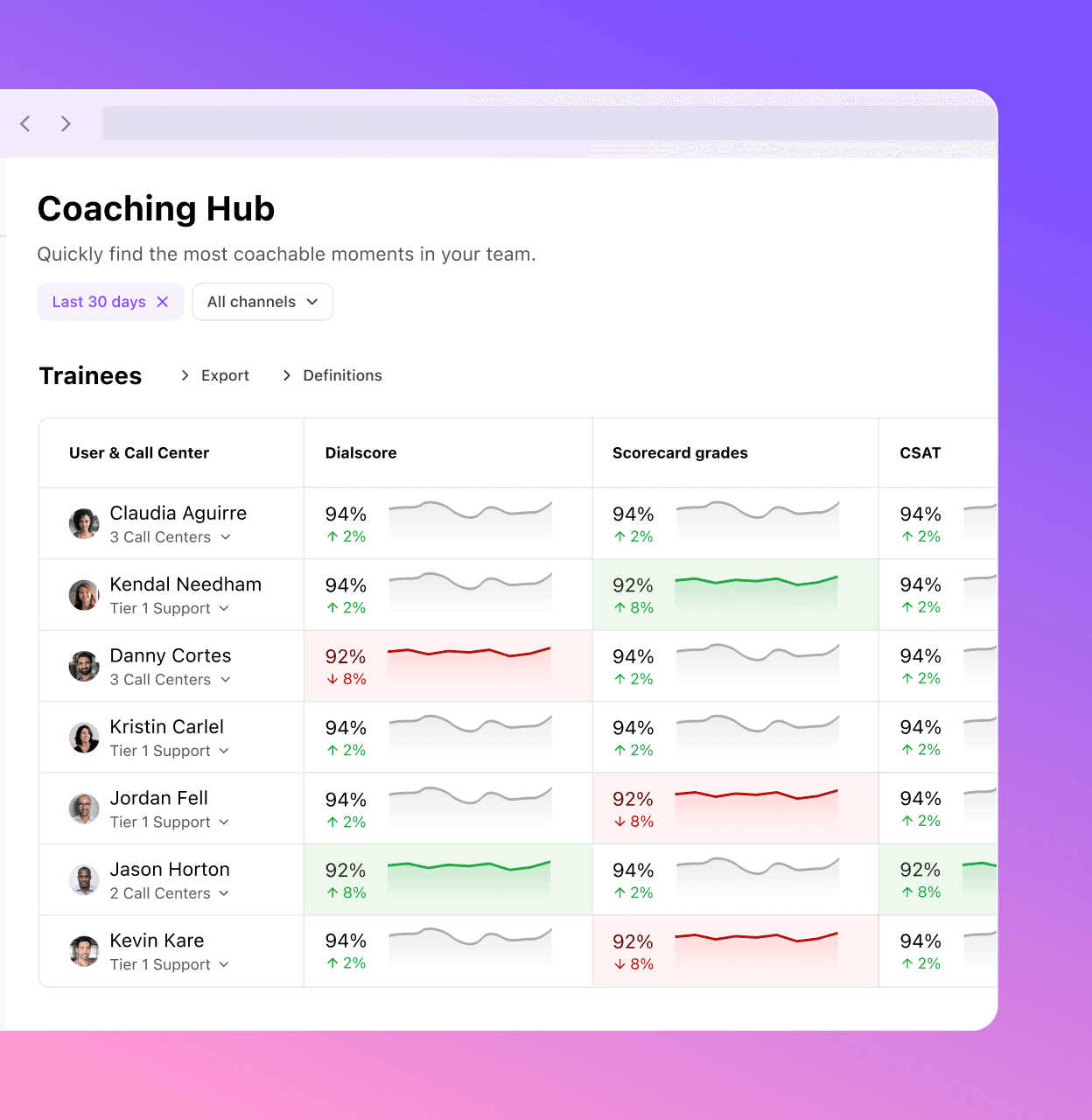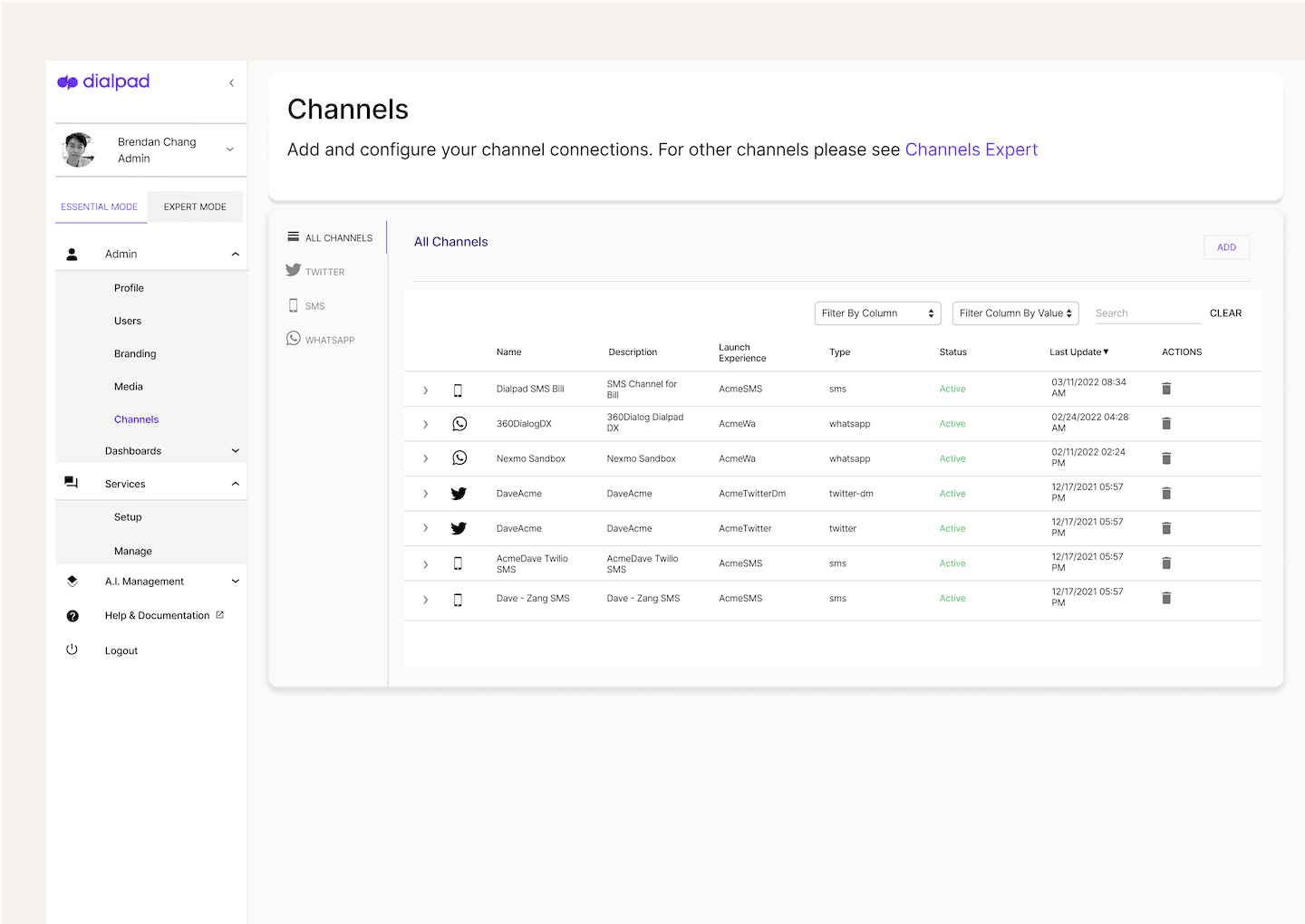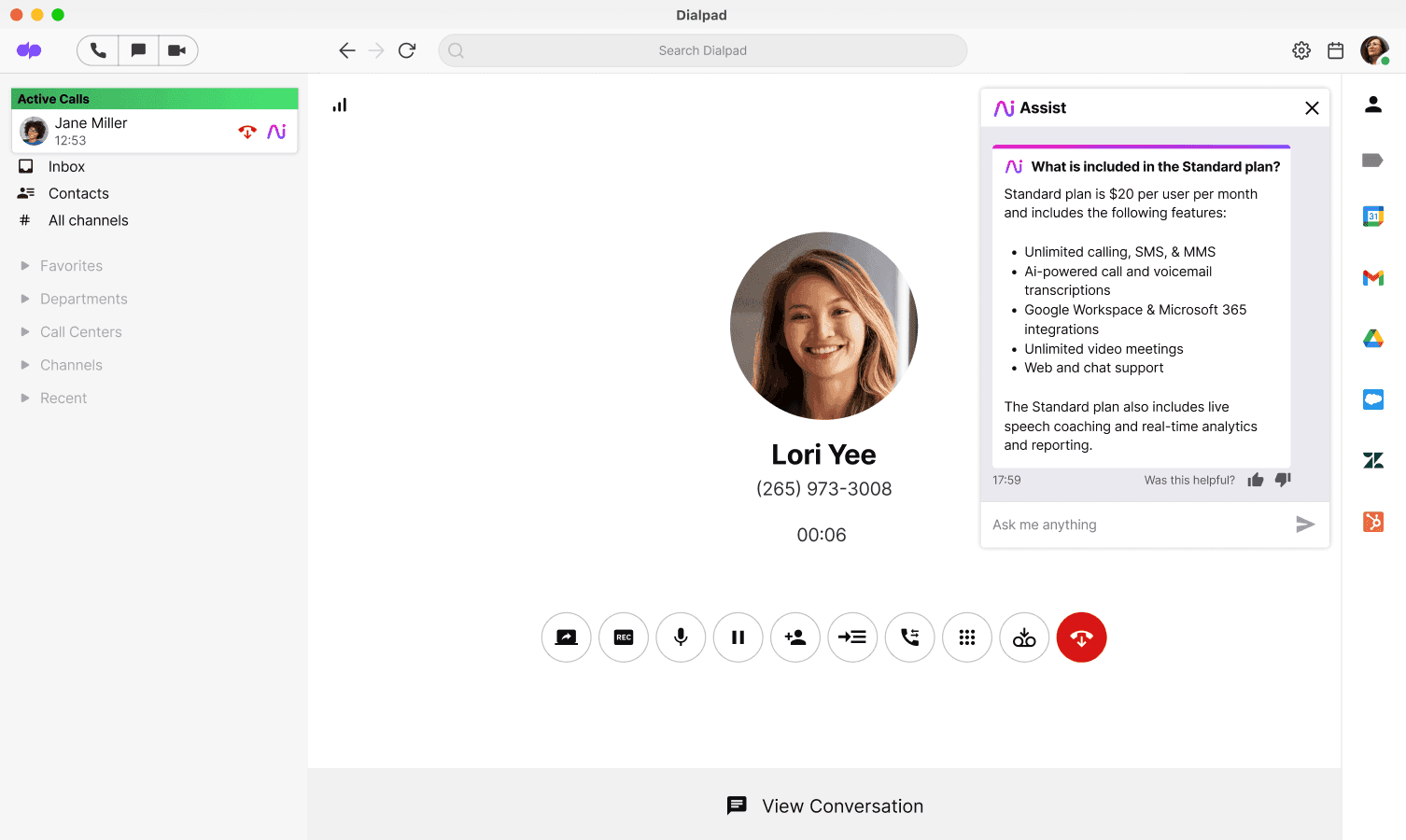
Tags
Share
Not only are customer expectations higher than ever, they’re also using more channels than ever before.
What that means for businesses: providing a good contact center experience is also more difficult than it’s ever been.
Whereas most businesses used to just have to deal with high call volumes, today they’re expected to provide seamless interactions and solve problems efficiently across phone calls, text messaging, live chat, and every social media platform their customers use.
So, how can you design a cohesive, efficient contact center experience that keeps customers happy—without burning out your agents and supervisors?
Keep reading to learn more about what makes for a good CX, which metrics to consider, and actionable ways to empower your contact center team.
What is contact center experience?
At a high level, the contact center experience refers to the overall interaction and service quality that customers and agents experience within a contact center environment.
This includes every touchpoint throughout the customer and agent journey, from initial contact (on any of the communication channels you use) to the resolution of the customer's issue.
What that also means is that the full “contact center experience” actually encompasses not only the customer service side of things, but also the internal processes and tools that your agents use to provide that service.
Customer service vs customer experience
While customer service and customer experience are often used interchangeably, they have distinct meanings:
Customer service: This focuses on interactions between customers and agents from a service perspective. Customer service is primarily reactive—that is, it’s concerned with resolving issues, answering questions, and providing support.
Customer experience (CX): This is a broader concept that encompasses the entire journey a customer has with your brand—not just when they have an issue or question. CX includes everything from initial awareness to the purchase to all of the post-purchase support and upsell/cross-sell steps and beyond.
What is the contact center experience for agents?
By the same token, the contact center experience for agents involves more than just their everyday interactions with customers. It also includes the agents’ work environment, tools, and processes—everything that impacts their daily work.
This experience affects your agents’ efficiency, job satisfaction, and overall performance. A positive agent experience is critical for maintaining high levels of service quality and reducing turnover (and turnover is expensive), because it directly influences their ability to handle customer inquiries effectively and contribute to the overall success of your contact center.
Why is the contact center experience important?
We’ve hinted at a few of these reasons already, but it’s hard to overstate the importance of understanding why your contact center experience is so important.
Not only can it help you prioritize your efforts and investments in this area, it also helps you improve both the customer and agent experience to achieve the best outcomes possible for your contact center and business.
It helps improve customer retention
A good contact center experience is crucial for customer satisfaction, and happy customers tend to stick around longer, resulting in higher retention rates and customer loyalty.
It affects agent morale and productivity
The contact center experience affects your team too. Happy, well-supported agents are more likely to perform well and stay with the company longer, which also reduces the cost of agent turnover (since you won’t have to spend as much time and resources on recruiting, hiring, and onboarding).
It influences your brand reputation
A by-product of happy customers is they tend to tell their networks about it. This positive word-of-mouth is essentially free advertising for you, and gives your brand’s reputation a boost—and in the future, can even lead to more referrals.
It has a huge impact on operational efficiency
From an operational perspective, a well-run contact center tends to have thoughtfully designed and streamlined processes, which can also improve overall efficiency and reduce operational costs.
It can give you a competitive advantage
Finally, a contact center experience that’s better than your competitors can be an effective differentiator for your brand. Even if your product isn’t quite as good, or your prices aren’t quite as low as everyone else’s, if you can make a name for yourself as a company that provides efficient and quality customer service, you will attract customers.
(Remember Zappos? They weren’t the only online store that sold shoes—but they built an entire business on the strength of their customer service.)
What impacts the contact center customer experience?
Several factors influence the quality of your contact center customer experience. From response times to agent knowledge, these elements play a critical role in shaping your customers’ perception of you.
Understanding these factors is important because they’ll help you implement even more targeted improvements that can continue enhancing your overall customer experience:
Response time: This is how quickly your customers receive a response from your agents, and can significantly impact their perception of service quality.
Agent knowledge and skills: Well-trained and knowledgeable agents are better equipped to handle inquiries and resolve issues effectively—even the hard questions. What’s important to note here is that you have to give them the tools to succeed too. Contact centers are notorious for their high turnover rates, and the right knowledge base or AI tools can go a long way in helping even newly hired agents handle every challenge effectively.
Availability of communication channels: Of course, it’s not always realistic to be available on every single communication channel out there. Choose the ones that your customers use the most, and make sure you’re providing a good experience on those select channels—with short hold times and prompt, accurate responses.
Consistency across channels: Just being available on different channels isn’t enough. A good contact center experience should also be consistent across all channels—meaning if your agents are polite and efficient on live chat, they should be providing a similarly high level of service on the phone.
Technologies to include in your contact center experience
Integrating the right technologies into your contact center can vastly improve both your customer and agent experience.
Advanced tools such as omnichannel platforms, AI chatbots, and real-time analytics can streamline operations, enhance service quality, and support agents in delivering exceptional interactions. Exploring and implementing these technologies ensures that your contact center remains competitive and effective in meeting the evolving needs of your customers and agents:
Agent engagement and coaching
Investing in agent engagement and coaching technologies is crucial for maintaining a high-performing contact center. Tools that offer real-time feedback are especially helpful because they empower supervisors to provide targeted coaching to agents, addressing their strengths and areas for improvement.
Dialpad’s Ai Coaching Hub, for example, gives coaches and managers a comprehensive resource for all their training and coaching needs.
Whether they need to coach agents or QA calls, they can do it all from a single dashboard in Dialpad:

Quality management (QM)
Quality management tools are essential for maintaining high service standards in a busy contact center. These solutions go one step further and let managers monitor agent interactions, ensuring that every customer touchpoint meets established quality benchmarks.
Dialpad, for example, has its own AI-powered automated scoring feature (Ai Scorecards), which streamlines the process of assessing agent performance, and helps coaches provide consistent and objective feedback.
All supervisors and admins have to do is create a list of scoring criteria for their customer calls. As the agent performs these tasks on calls, Dialpad Ai automatically checks them off so that when the supervisor reviews the call later, they can easily whether agents are performing based on the requirements laid out for them:

On top of that, Dialpad also integrates with Playvox for an even more robust suite of QM tools like calibration, disputes and appeals, and more.
Conversation intelligence
Conversation intelligence tools give you valuable insights into customer interactions by analyzing spoken and written conversations. Typically, these AI tools leverage natural language processing and machine learning to identify key themes, sentiment, and trends within customer calls and messaging conversations.
They also make it easier to extract actionable data from every interaction, which is great for contact centers that need to understand customer needs and preferences to provide tailored and effective service.
Omnichannel communications
Omnichannel communication is a must-have in contact center technology today, since most companies are providing support over multiple voice and digital channels.
By integrating multiple channels—such as phone, email, live chat, and social media—into a unified platform, businesses can ensure that customers can engage with your brand in the way that best suits them without having to repeat information or start over with each interaction.
Equally importantly, this also makes life easier for agents because an omnichannel contact center platform will show them conversations from all those different channels in one place instead of forcing them to switch back and forth between different applications and windows.
This integrated approach helps maintain context and continuity, which are crucial for delivering a consistent and personalized service. Here’s how it looks in Dialpad Ai Contact Center, for example:

Live chat and chatbot
Live chat and chatbots (or conversational AI) are pivotal in modern contact centers because they help you provide both immediate answers and more efficient handling of customer inquiries.
Live chat lets agents have more real-time interactions with customers, providing quick responses to their questions or concerns and reducing wait times. This instant support is especially valuable for those complex queries that require human intervention—you don’t want to automate everything fully, because there are always situations where customers need to talk to someone.
Chatbots, on the other hand, handle routine tasks and frequently asked questions autonomously, allowing for 24/7 support without the need for someone to be constantly online. These AI-driven tools can handle a high volume of interactions simultaneously, improving overall efficiency and freeing up agents to focus on more complicated or sensitive issues.
Smart callback
Smart callback is another feature that improves the customer experience by offering a convenient alternative to traditional hold times.
Instead of waiting on the line, customers can request a callback at a time that suits them. Unlike traditional callbacks, smart callback systems can be configured to prioritize callbacks based on factors like the urgency of the request or the customer’s history, which ensures that high-priority issues are addressed promptly.
Knowledge base
A well-maintained knowledge base is a cornerstone of effective contact center operations, because they should give agents easy access to all the information and resources they need to answer every customer question, no matter how tricky it is.
Typically, this centralized repository includes answers to common questions, troubleshooting guides, and detailed product or service information—and some contact center solutions can even integrate with your knowledge base.
For example, Dialpad’s Ai Agent Assist instantly pulls up information for agents so they don’t have to manually search for crucial information on a customer call:

Employee experience management
Employee experience management tools are critical in any positive and productive work environment, and contact centers are no different.
These tools focus on measuring and enhancing various aspects of the employee experience, such as job satisfaction, engagement, and well-being. Generally you’ll need features like surveys or other feedback mechanisms, and performance analytics to help identify areas where improvements can be made and make sure your employees feel valued and supported.
How to measure contact center performance: Top metrics to track
Measuring contact center performance is essential for understanding how well your center is meeting its goals and where improvements are needed. By tracking these metrics, you can assess performance, identify areas for improvement, and make data-driven decisions to enhance overall contact center effectiveness:
First Call Resolution (FCR): The percentage of issues resolved on the first interaction.
Average Handle Time (AHT): The average time taken to resolve a customer inquiry—including talk time and after-call work.
Customer Satisfaction (CSAT): How happy customers are with the service they received. Is usually asked in relation to a specific interaction (not overall service or product-related satisfaction).
Net Promoter Score (NPS): How likely customers are to recommend your company to others.
Service level: The percentage of calls answered within a specified time frame.
Abandonment rate: The percentage of customers who hang up before their call is answered.
Agent utilization: The proportion of time agents spend handling calls versus idle time.
Quality scores: This measures agent performance based on predefined criteria, including adherence to scripts and customer engagement.
How to improve contact center experience for customers: Best practices
To improve your contact center experience for customers, here are a few strategies to keep in mind across the entire customer journey:
Implement omnichannel support: Make sure your customers can seamlessly switch between channels without having to repeat themselves.
Provide self-service options: Use AI chatbots and IVR systems to handle simple inquiries and provide quick resolutions.
Invest in agent training: Regularly train your agents on best practices, product knowledge, and customer service skills.
Personalize interactions: Use your CRM data and AI tools to tailor interactions and offer personalized solutions based on your customers’ past interactions or purchases.
Monitor and act on feedback: Regularly gather and analyze customer feedback to identify areas for improvement and implement changes.
How to improve contact center experience for agents: 5 tips
Now, let’s look at a few ways to make sure you’re providing a good contact center experience for your agents. Even though many companies neglect this part of the contact center experience, it’s crucial for maintaining high levels of performance and job satisfaction. By prioritizing these areas and making sure your agents are well-equipped and motivated, it ultimately benefits the overall contact center and business.
Provide robust training: Ensure agents are well-trained in both technical skills and customer service techniques—and yes, this helps your customers too..
Give them the tools they need to succeed: Equip agents with the latest technologies and knowledge management systems to streamline their work.
Foster a positive work environment: Create a supportive and collaborative workplace culture to enhance job satisfaction—and improve retention.
Implement self-coaching: Coaching is important, but often, agents are able to coach themselves and self-correct, if they’re given that information. Tools like Dialpad’s Ai Playbooks and call recording playlists are great ways for agents to learn and improve their skills on their own.
Recognize and reward performance: Regularly acknowledge and reward agents for their achievements and contributions.
Set up for contact center experience success with Dialpad
A good contact center experience isn’t just essential for customer satisfaction—it’s important for agent performance too.
By understanding the factors that influence both customer and agent experiences and leveraging the right technologies, you can create a contact center environment that drives up CSAT scores, retains agents, and grows revenue.
Learn how teams across industries like healthcare, insurance, and finance are using Dialpad Ai Contact Center to provide a better contact center experience. Book a product tour with our team today!









